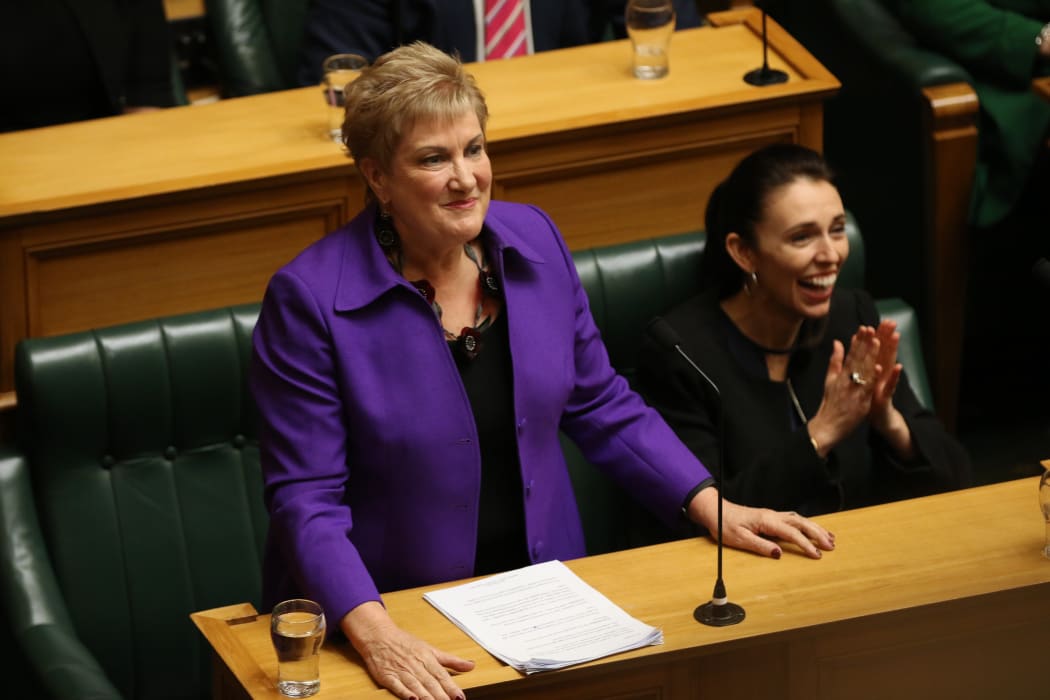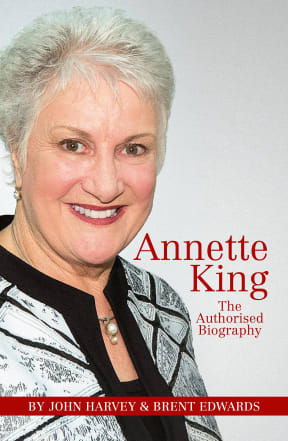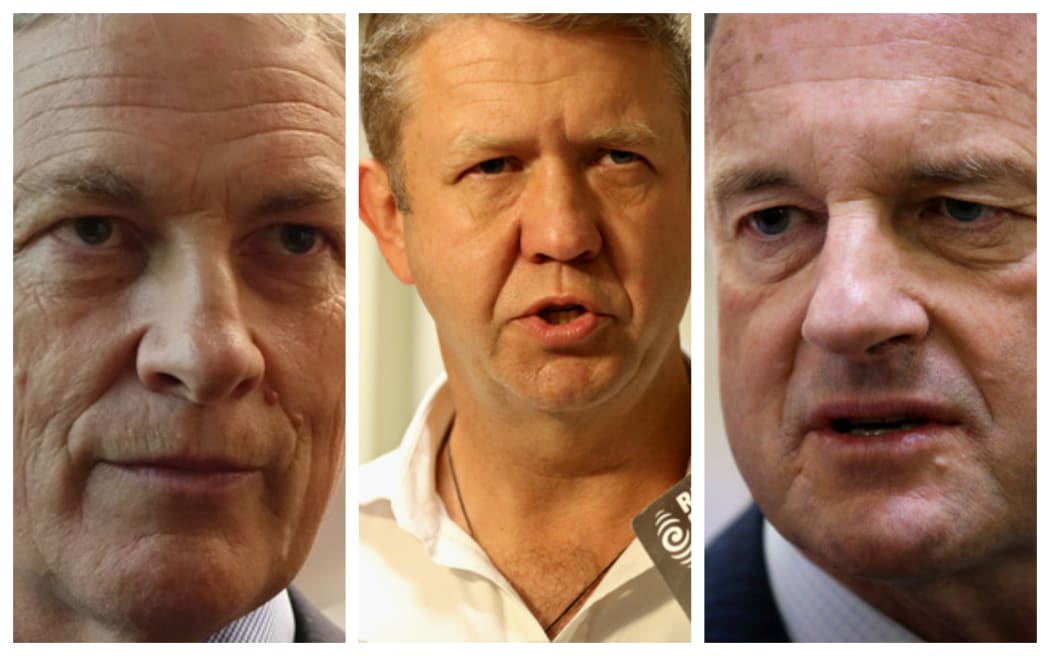When Dame Annette King quit politics in 2017 she was New Zealand’s longest serving female MP, 33 years in parliament.
As Labour member for Horowhenua, Mirimar and Rongotai she saw the Lange Government, the rise Rogernomics, as well as Helen Clark and John Key.
Highly regarded across politics, King served through 17 Labour and National leaders. She was deputy leader of the Labour Party and deputy leader of the Opposition from 2008 to 2011, and from 2014 until 1 March 2017. She was a cabinet minister in the fifth Labour government of New Zealand,
She became a Dame under National and she’s now New Zealand's High Commissioner in Canberra.
Now a new book, Annette King - The Authorised Biography, celebrates her life in politics it was launched in Wellington by Prime Minister Jacinda Ardern last week.
She joined Kim Hill to discuss her long career in public life.

Photo: VNP / Phil Smith
Here is an extract from Annette King - The Authorised Biography:
Labour in the doldrums (Abridged version)
After nine years Labour’s time in power came to an end in 2008.
Helen Clark resigned on election night and soon after the outgoing Cabinet met to discuss who should take over. Phil Goff, a minister in both previous Labour governments, was their pick.
While there was no leadership contest another MP had been equally keen, if not keener, than Goff to take on the job. David Cunliffe made it known he wanted the role but there was little support for him, particularly from the party’s senior MPs.
“We had a pre-Cabinet meeting after the election when we’d lost and we went around the table of the Cabinet about who should put their name forward and the consensus was it should be Phil but David Cunliffe was certainly lobbying and certainly lobbying Helen about the the leadership, but the consenus of the Cabinet was that Phil needed to take over, “ says Annette.
Goff jokingly says he should have given the job to Cunliffe. “If I had been Machievellian. I knew after years in politics that going into opposition after years of being in government your chances of getting back next election are very slim. We (Annette and Goff) both knew that.”
But Goff has no love of Cunliffe and says there was no way he would have had him as either leader or then, as Cunliffe wanted, deputy leader.
“Annette was always my choice. There was a gender balance there but there was total compatibility in us being able to work together.”
But then Cunliffe, according to Goff, came up with another proposal. This time he wanted the leadership team rejigged into a troika with Goff as leader and Annette and him as sort of co-deputy leaders. But the idea was rejected immediately.
“I was not going to buy into that either. I did not rate David as an individual and there was no way I was going to buy into that or that Annette would have. You know in the end you have a leader and a deputy leader. I gave David the role of finance spokesperson because I thought he was bright and I thought he would be able to handle it. He is bright. He could have handled it. I don’t think he did. He was missing in action too often,” says Goff.
Annette too has little time for Cunliffe and scoffed at the idea of a three-headed leadership team.

Photo: Upstart Press
But Goff never connected with the public and he faced constant sniping, mainly from supporters of Cunliffe.
When Goff stepped down after the 2011 election it opened the way for an all-out leadership contest.
Three Davids contested the leadership: Cunliffe, Parker and Shearer. Shearer’s candidacy was the most surprising. He had only been elected to Parliament in 2009 in the by-election to replace Helen Clark as the MP for Mt Albert.
But neither Cunliffe nor Parker had strong support and Shearer sensed an opening for his candidacy. Eventually the antipathy to Cunliffe among some in the caucus was so strong that what became known as the ABC (Anyone But Cunliffe) club swung in behind Shearer. Parker pulled out to avoid splitting the vote and Shearer was elected leader.
Shearer’s hold on the leadership was, however, never secure and he too was undermined by Cunliffe’s supporters, particularly at Labour’s 2012 annual conference in Auckland when there was a chaotic and acrimonious debate about changing the rules around how leaders should be elected. Amidst rumours of another coup, Cunliffe refused to rule out challenging Shearer.
Annette says no Labour leader has been treated as badly at an annual conference as Shearer was that day.
“Discussions in different corners of the conference led by people who wanted David Cunliffe, who kept denying knowledge or said there was nothing going on but the media were picking up what was going on. Many in the caucus were picking up what was going on and so there was this denial that there was any challenge to David Shearer. I think in the end he just became weary of the sniping and undermining and didn’t want to do it anymore,” she says.

Phil Goff, David Cunliffe and David Shearer Photo: RNZ
In response to the attacks on his leadership at the the conference Shearer demoted Cunliffe but it only put off his demise. The agitation to remove him never went away and there were constant rumours about his leadership. Both Goff and King supported Shearer during this time but the end was obvious.
“Both of us fronted up and told David we’ve done the numbers in caucus mate and they’re going to go for a spill and you won’t win it and so you can stare them down but they’re going to vote you down,” says Goff.
Annette though has a different view. “I think there was a whole lot more we could have done to support him. The other thing is that when he was challenged to go he should have done a Helen Clark in my view. He should have stared down people who said he needed to go.
“He rolled over. Look, there’s a whole lot of stuff in there, some of which I don’t understand because I wasn’t part of any discussions for Shearer to go. It became in the end that people went in and said you’re going to be challenged and he just went.”
The election to replace Shearer, who quit in August 2013, was conducted under Labour’s new rules which split the vote between the caucus 40%, party members 40% and affiliated unions 20%.
Cunliffe had long been the party favourite and had also been assiduous in wooing the unions. In a contest with Grant Robertson and Shane Jones he won 51.5% of the total vote, but only one-third of MPs voted for him. Robertson won the biggest share of the caucus vote with 47%.
Cunliffe started out with the immediate disadvantage of not having the support of the majority of caucus. Worse, many actively disliked and distrusted him particularly given their suspicion of the role he had played in undermining first Goff and then Shearer.
Annette is cautious when speaking about Cunliffe. “I’ve got to be careful what I say about David Cunliffe but David Cunliffe struggled in every caucus I was in with his fellow caucus members. He never really connected with the caucus members.”
Was Cunliffe as leftwing as his supporters supposed? “I think it was more personality. David was built up as the leftwing candidate. I haven’t really seen anything that distinguished him from the rest of us in caucus in terms of policy and the direction we were taking. You look at him. He was our finance spokesperson under Phil. He supported raising the age of superannuation. He supported capital gains tax. I think David always had the ambition to be leader.”
Annette says Cunliffe has a good IQ but no emotional intelligence.
“He didn’t pick up the vibe if you like of the caucus. And he didn’t, when he challenged the leadership, when David Shearer got in. And in the end of course he won it through the changes that were being made by the party on how we choose a leader and I don’t agree with the way we choose the leader.
“You have to have the confidence of your caucus in the leader. They know best who can do the role.”
She says there was just one positive out of what she calls Cunliffe’s “disastrous reign” although she did not think so immediately at the time. “I want to give credit to Matt McCarten for doing some good things to pull the organisation around the staff and caucus together. I didn’t know him very well. When he was chosen to be the chief of staff I really wondered whether he was the right choice but actually he did a very good job in many areas.
“But I think he found David really hard to manage. He was the only one who talked to him straight because David would change his mind.”
Many in Labour believed Cunliffe would perform better than David Shearer but his leadership did nothing to lift the party in the election campaign.
If it had been depressed by the election results in 2008 and 2011 Labour’s result in 2014 was even worse with the party winning just 25% of the party vote.
Cunliffe might have had ambitions of remaining leader but they were quickly dispelled at what Annette calls probably the most brutal caucus meeting she ever attended.
“It was more honest and more brutal than I think probably, or equal to, some of the really hard caucuses we had in the dying days of the fourth Labour government. And for one caucus it was probably the toughest I’ve ever seen the caucus.”
For Cunliffe it meant the end of his leadership.
Abridged extract from Annette King – The Authorised Biography by John Harvey & Brent Edwards, ($44.99 RRP, Upstart Press).

